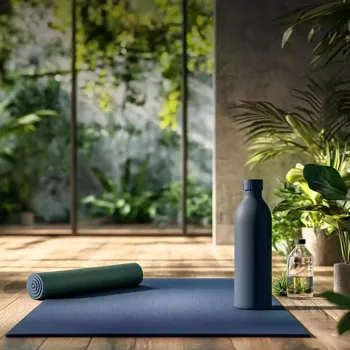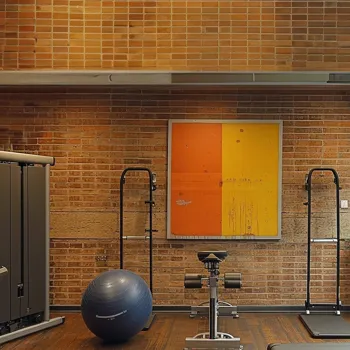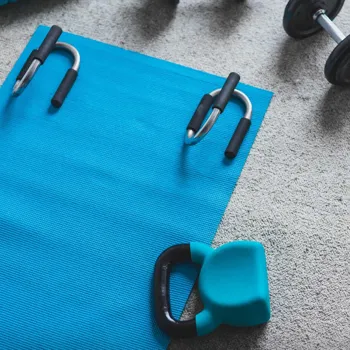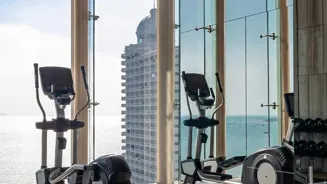Unveiling 5 Fitness Trends Before They're Mainstream! Dive into mindful movement, functional training, bodyweight exercises, outdoor fitness, and recovery strategies to boost your wellness journey. Discover
the future of fitness today!
Namaste, fitness enthusiasts! In the ever-evolving world of health and wellness, trends come and go faster than you can say "sun salutation." But some fitness practices possess an enduring quality, offering benefits that transcend fleeting fads.
These are the timeless trends, the ones that stick around because they genuinely work. We will explore five such gems just before they blow up the internet and become daily practices for everyone!
So, grab your yoga mat, lace up your trainers, and let's dive into these fitness trends that you can try before they become the next big thing.
Mindful Movement: Connecting Body and Soul
In our fast-paced lives, it's easy to get caught up in the hustle and bustle, often neglecting the connection between our bodies and minds. Mindful movement, encompassing practices like yoga, Tai Chi, and Pilates, encourages us to slow down, pay attention to our breath, and move with intention.

These disciplines are not just about physical exercise; they're about cultivating a deeper awareness of our bodies and how they feel.
Yoga, with its various asanas (postures), pranayama (breathing techniques), and meditation, helps improve flexibility, strength, and balance while promoting relaxation and stress reduction.
Tai Chi, a gentle martial art, involves slow, flowing movements that enhance coordination, balance, and mental focus. Pilates focuses on core strength, posture, and body alignment, leading to improved stability and reduced risk of injuries. The beauty of mindful movement lies in its adaptability.
Whether you're a seasoned athlete or a complete beginner, you can modify these practices to suit your fitness level and needs. Regular mindful movement can have a profound impact on your overall well-being, reducing stress, improving sleep, and enhancing your sense of body awareness.
These forms of exercise emphasize quality over quantity, fostering a sense of presence and connection to your inner self. Try incorporating short sessions of yoga or Tai Chi into your daily routine to experience the benefits of mindful movement firsthand.
You might be surprised at how a few minutes of focused movement can transform your state of mind and body. Remember, fitness is not just about achieving a certain physique; it's about cultivating a healthy and harmonious relationship with yourself.
Functional Training: Real-World Strength
Forget isolating individual muscles in the gym. Functional training is all about movements that mimic everyday activities, strengthening the muscles you use in real life. Think squats (for getting up from a chair), lunges (for walking and climbing stairs), and overhead presses (for lifting objects).

This approach focuses on compound exercises, which engage multiple muscle groups simultaneously, improving overall strength, balance, and coordination. The benefits of functional training extend far beyond the gym.
By strengthening the muscles you use in daily tasks, you reduce your risk of injuries, improve your posture, and enhance your overall functional capacity. Imagine effortlessly carrying groceries, playing with your kids, or gardening without feeling aches and pains.
Functional training also emphasizes core strength, which is essential for stability and injury prevention. A strong core acts as a foundation for all your movements, allowing you to perform activities with greater ease and efficiency.
You can incorporate functional training principles into your existing workout routine by focusing on compound exercises and movements that mimic real-life activities.
Consider working with a qualified trainer who can guide you in proper form and technique, ensuring you get the most out of your workouts. Functional training is not just a trend; it's a practical approach to fitness that prepares you for the demands of everyday life.
Instead of chasing superficial gains, focus on building functional strength and mobility that will benefit you in the long run.
Bodyweight Training: Your Own Gym
Who needs fancy equipment when you have your own bodyweight? Bodyweight training is a highly effective and accessible form of exercise that utilizes your own weight as resistance.

Exercises like push-ups, squats, lunges, planks, and pull-ups can be performed anywhere, anytime, making it a convenient option for busy individuals. The beauty of bodyweight training is its versatility.
You can modify exercises to suit your fitness level and gradually increase the difficulty as you get stronger. It's also a great way to build strength, endurance, and flexibility without putting excessive strain on your joints.
Bodyweight training engages multiple muscle groups simultaneously, promoting overall strength and coordination. It also improves your body awareness and control, helping you move with greater efficiency and grace. Plus, it's free!
You don't need a gym membership or expensive equipment to reap the benefits of bodyweight training. All you need is a little space and the motivation to get started.
Start with beginner-friendly exercises and gradually progress to more challenging variations as you get stronger.
Consider using online resources or fitness apps to guide you through workouts and ensure proper form. Bodyweight training is not just a stopgap measure; it's a sustainable way to stay fit and healthy for life.
It's a reminder that you don't need external tools to transform your body; you already have everything you need within you.
Outdoor Fitness: Embrace Nature's Gym
Step away from the sterile environment of the gym and embrace the great outdoors! Outdoor fitness encompasses a wide range of activities, from hiking and running to cycling and swimming. Exercising in nature offers a myriad of benefits that go beyond physical fitness.

Studies have shown that spending time in nature can reduce stress, improve mood, and boost cognitive function. The fresh air, natural light, and scenic views can make your workouts more enjoyable and motivating.
Outdoor activities also provide a welcome change of scenery, preventing boredom and burnout. Whether you're exploring a local park, hiking a mountain trail, or swimming in the ocean, outdoor fitness allows you to connect with nature while getting a great workout.
It's a fantastic way to escape the pressures of daily life and recharge your batteries.
Find an outdoor activity that you enjoy and incorporate it into your weekly routine. Gather your friends and family for a hike or bike ride, or join a local running club to meet new people and stay motivated.
Remember to wear appropriate clothing and footwear, and always be mindful of safety precautions when exercising outdoors. Outdoor fitness is not just about physical exercise; it's about cultivating a deeper connection with nature and nurturing your overall well-being.
It's a reminder that the world is your gym, and the possibilities are endless.
Recovery and Restoration: The Key to Progress
In our pursuit of fitness goals, we often focus solely on exercise, neglecting the crucial role of recovery and restoration. However, adequate rest, sleep, and proper nutrition are just as important as workouts in achieving optimal results.
Recovery allows your body to repair and rebuild muscle tissue, replenish energy stores, and adapt to the demands of exercise. Skimping on recovery can lead to fatigue, burnout, injuries, and decreased performance. Prioritize sleep by aiming for 7-9 hours of quality sleep each night.
Create a relaxing bedtime routine, avoid screens before bed, and ensure your bedroom is dark, quiet, and cool. Incorporate active recovery methods like stretching, foam rolling, and yoga to improve circulation, reduce muscle soreness, and enhance flexibility. And don't forget about nutrition!
Fuel your body with whole, unprocessed foods that provide the necessary nutrients for recovery and repair.
Stay hydrated by drinking plenty of water throughout the day. Listen to your body and take rest days when needed.
Pushing yourself too hard without adequate recovery can do more harm than good. Recovery and restoration are not luxuries; they're essential components of a well-rounded fitness program.
By prioritizing rest, sleep, and proper nutrition, you'll be able to train harder, recover faster, and achieve your fitness goals more efficiently.

















